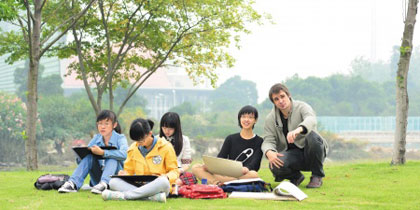
June 16, 2014, by Teaching at Nottingham
UNNC teaching development projects
We are delighted to announce that the successful proposals for the first UNNC Small Teaching and Learning Development Grant (STL) have been selected, with project ideas ranging from a digital story to linguistic and cultural diversity at UNNC. You can read about the successful applicants and their projects below.
Intercultural Communication in the Teaching and Learning Contexts at UNNC
Dr. Mukul Saxena, Dr. Du Ping, Dr. Simon Harrison, Dr. Benedict Lin
The University of Nottingham Ningbo China (UNNC) provides a unique multicultural teaching and learning environment for the staff and students. This study aims to investigate the nature of linguistic and cultural diversity at UNNC and how teachers and students negotiate meanings in the classroom drawing on their intercultural resources. As scholars in Applied Linguistics and Intercultural Communication, we are interested in exploring through this project how culture shapes the ways in which people perceive the world, communicate their perceptions and knowledge, and interpret communicative intent in the process of knowledge transfer in intercultural higher educational context.
Enhancing students’ self-regulation within formative feedback and assessment loop: watching videotaped authentic tutoring sessions on threshold concepts.
Dr. Paolo Bianchi, Mrs. Giovanna Comerio
The aim of Higher Education is to help students becoming independent and life-long learners. We should involve students in a dialogue to sustain their self-regulated learning. Building on theories of social learning and situated learning we focus on formative feedback in order to promote critical thinking and autonomous learning skills. We will produce short videos representing dialogues between tutor and student(s) exchanging formative feedback on a threshold concept in the targeted discipline/course. These videos will be examples for students of how to build sound knowledge through teachers’ feedback.
Student-Centered Transmedial Learning Project
Dr. Melissa Brown, Dr. David H. Fleming, Dr. Fillippo Gilardi
This ‘transmedial assemblage’ project embraces interactive and heuristic models of student learning, whilst multiplying the points (and loci) in which students can create and transfer knowledge. The project will address UNNC students’ express desires to do more practical coursework components, whilst challenging them to (re)create knowledge and concepts for themselves. The transmedial assemblage makes an on-going ‘event of thought’ by cultivating creative means of self-learning in between a variety of platforms (including photography, filmmaking, editing, performance, collage, transmedia storytelling). We believe this will instil deep learning and critical thinking, and allow students to grasp concepts rather than simply memorise material.
Enhancement of Problem-Based Learning in an Environmental Sciences Field Course
Professor David Higgit
The first cohort of the 4+0 Environmental Sciences degree enters Part I in 2014-2015 and there is a requirement to develop and deliver a residential field course for these students. The implementation of the module requires the development of suitable background resources and the design of innovative assessment methods which are aligned with the learning outcomes. In order to enhance the learning experience for students it is proposed to develop a “digital story” exercise which will require student groups to produce a video explaining their field data and interpretations to a general audience. This approach can be used to supplement the technical skills acquired from fieldwork with soft skills in teamwork and oral presentation. It also draws upon students’ inherent interest in content-rich media.
Looking for the optimal e-learning tool
Dr. Dorota Rzycka
The main objective of my project is to profile the characteristics and functionalities of the optimal e-learning tool. Reflecting on my previous work experience gained in the communications’ industry I have noticed that there is a growing hiatus between teaching methods and tools used by the professional trainers in private companies and the teaching technologies used in educational institutions. I think that both should become complementary instead of functioning apart. I believe that testing a commercial product called Adobe Presenter (which is an authoring software) in the language teaching environment will allow me to identify the key features of a motivating, stimulating and rewarding e-tool. My research outcomes will be based on two methodological approaches:
1) qualitative and quantitative evaluation of students’ learning results
2) students’ comments, suggestions and evaluations of the product.
Teaching and Learning Enhancement Office
The University of Nottingham Ningbo China
No comments yet, fill out a comment to be the first

Leave a Reply